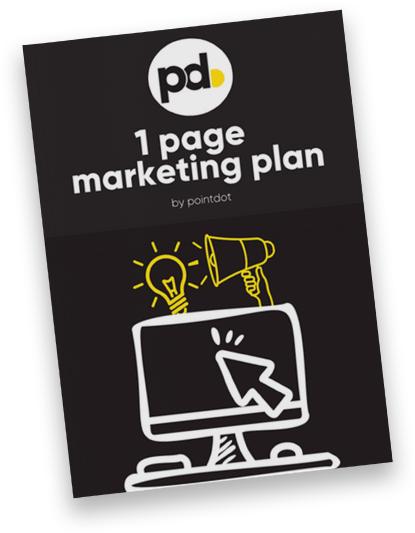
It's All About Having A Good Marketing Plan
Some companies underestimate the role of marketing and how it can help you reach your business goals. In contrast with sales, for example, it doesn’t yield immediate results. This is why some companies might only enact sporadic marketing initiatives here and there. But if your company’s marketing “strategy” is not hinged on structure and consistency, you’re setting your brand up for stagnation or, worse, failure.
It’s better to see marketing as an investment with long-term advantages. The more research, effort, and care you put into it, the more advantages you’ll gain. Even just having clearly defined marketing goals and a defined target audience can already put you ahead of the curve.
In this article, we’ll go over what constitutes a marketing plan, how to write a marketing plan, and how you can use it as a long-term growth strategy for your business.

What Is A Marketing Plan?
A marketing plan is a business tool that outlines the marketing strategy for your products and services, as well as how you’re going to reach your audience.
The Elements Of A Marketing Plan
If you look for a free marketing plan template online, you’ll find that their contents may vary. Some may be more complex than others, and some may include things that others don’t. However, you’ll find that all marketing strategies will tend to have certain elements in common, such as market research, plans for a marketing campaign, marketing tools, and budget.
In a traditional marketing plan, you may also see the use of more classic business tools such as the marketing mix, SWOT analysis, PESTLE analysis, Ansoff matrix, or even the ABC model of attitudes. While these types of tools can help you gain a better understanding of your brand, they take time to develop. Because of this, they’re not always necessary to include, especially if time is a major factor.
Do bear in mind that following a marketing plan template may feel rigid, especially if you require a more complex marketing strategy or your brand has special additional requirements.
All that said, what are the elements of a good marketing strategy? Let’s go over exactly what is in a marketing plan:
Macro Analysis
The macroenvironment includes all external factors that affect your brand. This includes the segmentation of your target audiences (i.e., demographics, psychographics), the competitive landscape, industry-standard practices and laws, socioeconomic factors, or cultural norms that affect consumer behaviour. Conducting the relevant market research regarding these topics will influence how you position your products.
Considering these factors can mean the difference between failure and success of your marketing plan. In Sydney, for example, a startup called Zor Technology was shut down despite having a projected profit of six figures in its first year. The reason was that the owner failed to research the legal implications of selling a product that was too similar to another company’s IP. So, not only did his marketing plan fail but so did his company.
Micro Analysis
In contrast with the macroenvironment, the microenvironment includes internal factors that can be directly affected by your marketing decisions. This includes elements like your unique selling proposition (USP), pricing and positioning strategy, brand messaging, and the like.
Marketing Objectives
It’s important to have a goal for your brand that is both realistic and quantifiable. For example, increasing the existing customer base by X amount or increasing profits by Y amount.
Additionally, you can have sub-objectives for other aspects of your marketing plan strategy, like increasing search engine ranks by X amount or increasing your follower base on social media platforms by X amount.


Timeline And Execution
Once you have a more clear understanding of your macro and micro environments, then you’ll be much more well-equipped to decide on your marketing initiatives, which channels would be most efficient, and on what schedule.
Typically, this section of the marketing plan identifies what sort of content you’ll use and on which channels. Examples of executions include a social media marketing plan (including a content strategy with an editorial calendar for post scheduling), a paid digital media and digital marketing strategy, and/or a PR strategy.
Marketing Budget
Your overall budget will dictate how extensive your content strategy will be and guide your choice of platforms and channels. Regardless of these variables, having an outline of your budget will ensure you don’t under or overspend.
3 Benefits Of Having A Marketing Plan
Identify Your Ideal Target Audience
You or your marketing team may have assumptions about who you believe would be interested in your products. Conducting marketing research is important in verifying whether these assumptions carry any weight. It may also broaden your perspective and potentially reveal a whole new target audience you wouldn’t have otherwise considered before.
When you make the effort to truly analyse your audiences, it will reveal many characteristics you can capitalise on. Understanding their needs, wants, expectations, and pain points allows you to optimally position your products and create marketing campaigns that maximise appeal.
Accurately Define Your USP
It’s vital to understand who your audience is, who you are relative to your competitors, and where you stand within your industry. This knowledge will allow you to better position your products in a way that sets you apart from other brands.
Marketing strategies are extremely valuable in that they will help you gain insights into your USP that you would have otherwise overlooked had you not done your research.
Learn How To Best Maximise Your Time And Resources
A truly effective marketing plan will always have a budget outline. Defining this budget will enable you to prioritise the marketing efforts that are most effective to reach customers, as well as know how much to allocate for each effort.
This is especially beneficial if you have a long-term marketing plan with clearly defined phases, each with its own goal, budget, timeline, and approach.

3 Consequences Of Not Having A Marketing Plan
Prone To Budget Problems
A comprehensive marketing plan should have a whole section dedicated to your marketing budget. This includes how much is allocated towards paid ads on digital marketing channels, development of marketing materials, inbound marketing efforts, and the like.
If your marketing department doesn’t have a marketing plan and just randomly runs campaigns with no clear discernable timelines or objectives, you will be more prone to overspending. Not only that, but the lack of a plan will also more than likely yield poor results.
Competitors Will Get Ahead Of You
The fundamental value of a marketing plan is no secret in the business world. Regardless of which industry you operate in, it’s more than likely that your competitors’ marketing tactics are calculated efforts guided by a predefined marketing plan.
Competitors tend to share a portion of your desired target market, so if they’re strategically trying to reach them through social media, search engine rankings, or even through a blog post, then you should be, too.
Consumer Perception Of Your Brand Will Suffer
Companies that don’t have a clearly defined marketing roadmap tend to appear more volatile to their target market. A brand without a marketing plan may either implement its marketing activities in inconsistent bursts or have none whatsoever. This won’t bode well for potential customers whose requirements for brand trust hinge on appealing and timely marketing activities.
Final Thoughts
Marketing plans are an essential part of your overall business plan. It may seem like a daunting task to plan your marketing strategy for the long term, especially if you’re unsure about what the future holds for your brand. However, if you make the effort to research diligently and truly try to understand what you want your brand to achieve, it will help reveal a brighter path to success.

1 page marketing plan.
Since 2016, pointdot has grown by adopting the same marketing principles in this 1-page plan, into our own agency and business. We have grown from a 2-person team, to a team of 11 super talented marketers. Download your free copy of this brilliant 1-page marketing plan and begin growing your business!

